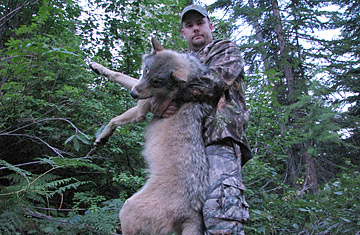
Robert Millage, 34, with a wolf he caught on the first day of hunting season in 2009 in Idaho
For Robert Millage, killing the first wolf in Idaho's inaugural hunt was a dubious honor. In May 2009, the gray wolf was taken off the list of endangered species for the Northern Rocky Mountain region, and debates between hunting advocates and wolf sympathizers raged in the months leading up to the start of hunting on the first of September.
Shortly after the sun rose that morning, Millage, a real estate agent from northern Idaho, shot the historic wolf. Within a few hours, he started getting angry calls — followed by angrier e-mails and Craigslist threats that included directions to his house — from people who found his contact information on his agency's website after reading his name in the news. "They didn't want to talk. They just wanted to yell," Millage says.
Wolves are divisive animals. To some, they are livestock-ravaging, child-endangering 120-lb. (55 kg) beasts that should be controlled through state-sanctioned hunting. Others believe they majestically embody nature in an almost spiritual way, and for this group, killing wolves seems one step away from offing Fido. "The big-bad-wolf thinking is not in line with what we understand about wolves and the ecosystem," says Mary Beth Petersen, a Minnesota attorney who e-mailed Millage after seeing a photo of him kneeling with his rifle over the wolf. But by the time hunting season ended on March 31, Millage's kill had led to extended legal protection not for the gray wolf but for another species: the Idahoan hunter.
Laws prohibiting "hunter harassment" have been passed in all 50 states, having proliferated at the behest of sportsmen organizations from 1982 to 1995. (In 1994 a similar restriction was added to the federal criminal code.) Many of these laws ban the use of physical conduct to impede a lawful hunt, such as banging pots and pans to scare off prey or taking a blowtorch to a hunter's crossbow. But other provisions have sparked outrage over First Amendment rights and have subsequently been struck down by judges for hindering hunting opponents' freedom of speech.
Idaho is one of several states dealing with hunter harassment, an issue that manifests itself in unique forms across the U.S. "Harassment is a problem," says Andrew Arulanandam, spokesman for the National Rifle Association (NRA). "And what we're trying to do is make sure it isn't a problem. We're always trying to preserve the safety of hunters." The bill that recently passed both houses in Idaho — and was then signed by Governor C.L. "Butch" Otter on April 8 — extends hunter protections in two ways: by taking state-issued hunting permits, licenses and tags out of the public domain, and by making it illegal to "harass, intimidate or threaten" hunters via telephone, e-mail or website posting. (Proponents, wise to the past, added the caveat that unlawful conduct does not include constitutionally protected activity.)
Debate about whether to remove hunting permits from the public record is reminiscent of the battle over making concealed-carry permits private, an effort that has been increasingly successful in the past few years. Supporters of such a public-records exemption say there's no reason the general public needs access to information about citizens who are simply exercising legal rights. "There are no downsides," says Idaho state representative Judy Boyle, a Republican who proposed the measure. If a hunter seems to be doing something wrong, she says, let the police investigate: "We're not vigilante people," she says. Millage, who, as a way to combat his harassment, posted on a website the vitriolic missives he received, takes the same line: "There's no reason for all the names to be handed out ... It's all about intimidation. [People say] it's not for harassment, but what other purpose does it serve?"
